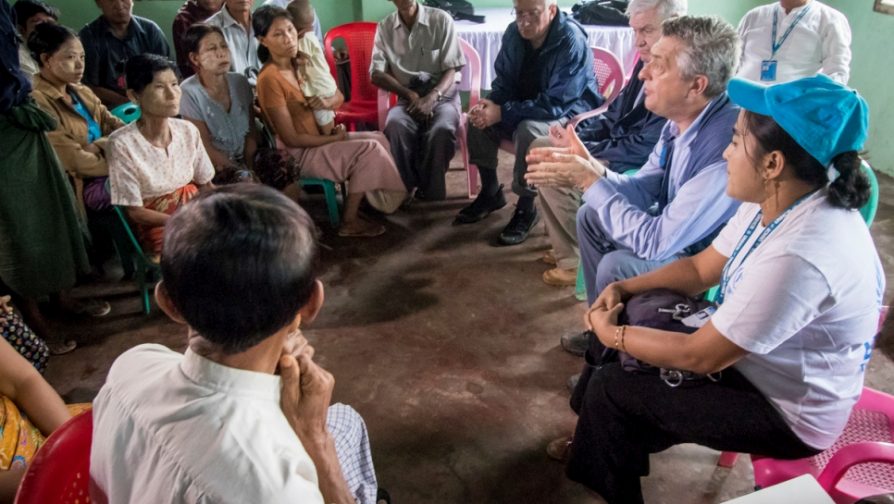Filippo Grandi meets with communities in restive Rakhine state to better understand their needs and challenges.
MAUNGDAW, Myanmar – The UN High Commissioner for Refugees, Filippo Grandi, has appealed to communities in Myanmar’s restive Rakhine state to unite in the face of fear, mistrust and underdevelopment.
On his first official visit to South-East Asia, Grandi met with displaced people, local communities and the authorities in Sittwe and Maungdaw townships to better understand their needs and challenges.
Last October, an estimated 20,000 people were displaced around Maungdaw in a security operation prompted by attacks on several border guard posts. Most have returned home but some are still hosted by local villagers pending agreement on return and relocation sites. Around Sittwe, 120,000 people remain in camps for internally displaced people after they were uprooted by inter-communal violence in 2012.
Masoota Hatu has lived in Sittwe’s Dar Paing camp for five years, facing health problems that she cannot afford to treat. Only two of her four children are in school as there is no secondary school in the camp.
“We need to move from survival to real life with opportunities.”
“It’s very difficult,” the 55-year-old widow told Grandi. “What I want most is to go back to my village so that our lives can improve.”
Like many Muslims in Rakhine state, stateless people like her cannot move freely without authorization and cannot access basic services like healthcare, education and their livelihoods easily.
“These people deserve a better future than the present conditions of extreme poverty, deprivation and isolation. We need to move from survival to real life with opportunities,” said the High Commissioner. “This is an extremely complex situation but it’s possible to work towards solutions.”
In March, an interim report by the government-appointed Advisory Commission for Rakhine State recommended steps to end displacement and promote inter-communal dialogue. The government has endorsed the report and agreed to implement these recommendations.
It will not be easy – the atmosphere in Maungdaw remains tense after the October violence that was allegedly perpetrated by members of a militant group.
On Tuesday, when Grandi met a group of Rakhine villagers living next to a Muslim village in Maungdaw, they told him the communities used to live and work together.
“But after the October violence, we are afraid to leave our homes to collect firewood or fish for a living. Our children are also staying home from school. We need some assistance until things improve,” said a community leader.
The High Commissioner urged both communities to resume dialogue. “You have the same fears for your families, and the same anxieties over how to provide for them,” he said. “Humanitarian assistance is important but it will not last forever. By learning to live together in peace, you can lay the groundwork for prosperity and development.”

Villagers in a Rakhine village north of Maungdaw share their fears with the High Commissioner.© UNHCR/Roger Arnold
In Maungdaw, Grandi visited a UNHCR, UN Refugee Agency, supported project to promote peaceful co-existence through vocational training classes. It brings together 20 Muslim and Rakhine women to learn sewing skills and basic literacy, as well as health and hygiene education. Although they would appear to have little in common, many of these women have either had no education or had to drop out of school to support their families.
May Than New, 23, dropped out after middle school as her parents could not afford further education. She sold fuel in a shop before joining the sewing class. Now she plans to work as a tailor and teach sewing upon graduation.
“My parents always had Muslim friends in our house and we believe discrimination will only bring problems,” she said. “This class has helped me to understand my Muslim friends better.”
Her classmate Somira, 19, added: “I didn’t know any Rakhines before but now I have made some friends in class.”
“This class has helped me to understand my Muslim friends better.”
UNHCR has also helped to set up a market in downtown Maungdaw where some 2,000 families of Muslim, Rakhine, Hindu and other minority groups go for their daily food supplies and social interaction.
Asked what would help to improve their lives, a Muslim villager in Maungdaw said: “We just want to live peacefully, to have an identity card and the same rights as the others.”
On Wednesday, the High Commissioner met with Myanmar’s State Counsellor Aung San Suu Kyi and other ministers to discuss the situation in Rakhine State, the displacement in Kachin and northern Shan state, as well as the potential for mainly ethnic Karen refugees to return home voluntarily from Thailand.
From Myanmar, Grandi will move on to Thailand and Bangladesh to discuss refugee issues in both countries, before ending his regional tour on July 11.
Share on Facebook Share on Twitter